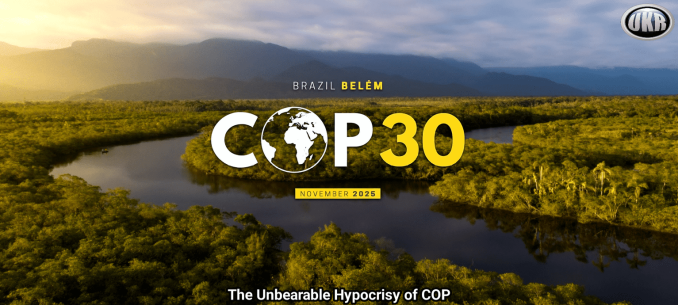
The unbearable hypocrisy of COP
BRIAN MONTEITH
Last year, in Baku, Azerbaijan, the 29th UN’s Conference of the Parties on Climate Change excelled itself in providing the global stage for cant and hypocrisy.
The petrostate’s government had declared the event as ‘The COP of Peace’ despite Azerbaijan military forces invading the disputed territory of Nagorno-Karabakh the year before, displacing 100,000 ethnic Armenians and imprisoning many others as political prisoners.
Then COP29 chief executive and Azerbaijan’s deputy energy minister, Elnur Soltanov, was filmed agreeing to facilitate commercial oil or gas deals at the climate summit by the campaign group Global Witness.
The subsequent failure of COP29 to satisfy demands from emerging nations – including China – for a huge transfer of wealth of £1 trillion was lost in the sandstorm of outrage when Azerbaijani President Ilham Aliyev’s address included the immortal words that oil and gas was a ‘gift from God’. In the end, ‘only’ £230 billion of climate subsidies were committed to.
Surely, COP30 – to be held in Belém, Brazil, where the clearance of Amazonian rainforest is, we might say, topical, could not trump Azerbaijan’s unravelled sanctimony.
Not to be outdone on the global stage, Brazilian politicians have excelled themselves by setting the scene for what is now becoming the annual hypocrisy lympics.
First, at the very conference where deforestation will be a seminal issue, the Brazilian government sanctioned the chopping down of tens of thousands of trees to facilitate an eight mile long four-lane highway from the airport to the venue. As hundreds of private jets land and their retinues are chauffeured to their exotic hotels – or the two cruise ships chartered to provide an additional 6,000 beds – they can comfort themselves in the knowledge they have inspired a project that perfectly encapsulates the gap between climate rhetoric and action as Brazil markets itself as an environmental champion while chain-sawing protected ecosystems for conference logistics.
Destroying the ‘lungs of the Earth’ to host a conference about saving the planet certainly trumps a mere podium tribute to carbon fuels. This visually striking symbol of climate hypocrisy must surely win a gold medal?
And yet the Brazilian authorities have gone one better, as the official competition authority, CADE, ruled the Amazonian Soy Moratorium – the world’s best practice voluntary sustainability agreement – as unlawful, accelerating the process of deforestation.
Coming in advance of a conference discussing deforestation as a source of climate change, that takes some beating.
Environmentally speaking, cultivation of the humble soy bean has a lot to answer for. Brazil dedicates an area larger than Germany to soy production, while still continuing to clear 500,000-800,000 hectares annually for greater output. That’s equivalent to destroying an area larger than North Yorkshire every year. No wonder Brazil has complete dominance of global soy bean production, accounting for around 40% of global output.
The voluntary soy moratorium of 2006, agreed between major grain traders, environmental groups and the Brazilian government, prohibited soy purchases from farms which cleared Amazon rainforest after July 2008. Over 19 years, the moratorium prevented around 18,000 square kilometres of Amazon deforestation – an area equivalent in size to Portugal – while allowing Brazilian soy production to expand dramatically on previously cleared land.
The agreement became the gold standard for zero-deforestation commitments worldwide, inspiring similar models for cattle, palm oil and other sectors. It demonstrated that agricultural expansion and environmental protection could coexist, protecting critical ecosystems while maintaining global food security.
Soy is used largely for animal and fish feed (mostly into poultry and pork feed but also the farming of Carp, Tilapia, Salmon and Sea Bass) as well as being the basic component of Tofu and Tempeh for vegetarians and vegans. Delivering a mediocre yield per hectare, soy requires a vast amount of land to produce. Soy for oil production is planted in an area of 125 million hectares, or almost 30% of the oil crop area worldwide, yet supplies just 28% of vegetable oil demand.
China is the world’s biggest importer of soy, accounting for 73% of Brazil’s total soybean exports by value, followed by Spain. However, deforestation to provide more land for soy cultivation remains a huge threat to the Amazon rainforest. The daily expansion of soy farming in Brazil currently totals 3,836 hectares per day (just below the size of Bournemouth).
With the ending of the soy moratorium, the amount of land being cleared will grow, putting the lungs of the world at even greater risk. To imagine a more absurd and alarming environmental nightmare for conservationists would be difficult.
With the great, the good and the grifters now assembling in Brazilian rainforest and the slap-on-the-back medal ceremonies of pledges and personal-best performances still to come the climate Hypocrisy Olympics are well underway. The Prince of Wales and Keir Starmer, alongside West Yorkshire Mayor, Tracy Brabin, are leading our representatives hoisting the union flag without any self-awareness of double standards. Working from home to curb the kerosene-fuelled air-miles is so not their diplomatic bag.
Can COP31 be any better? The next venue will be announced in Brazil, but Australia and Turkey are the bidders most likely to succeed. What environmental hypocrisies might they bring to the table? One thing’s certain, so long as it isn’t them who has to pay for the jolly to end all jollies, our politicians will find a way to keep the hypocrisy olympics on the front pages and on our screens every November.
Click here to subscribe to our daily briefing – the best pieces from CapX and across the web.
CapX depends on the generosity of its readers. If you value what we do, please consider making a donation.
This article (The unbearable hypocrisy of COP) was created and published by CapX and is republished here under “Fair Use” with attribution to the author Brian Monteith






Leave a Reply